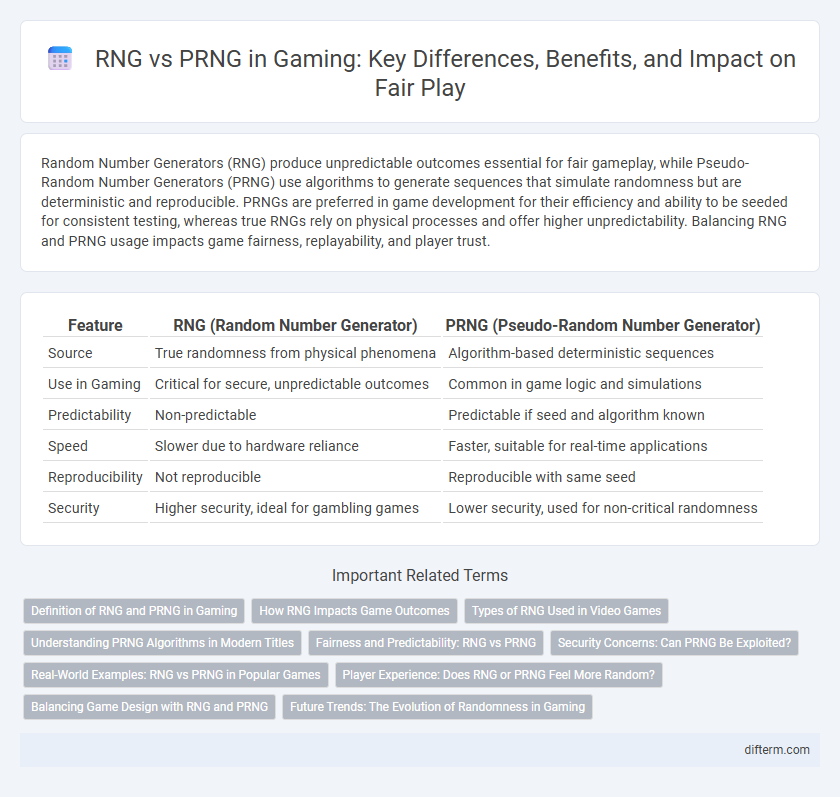Random Number Generators (RNG) produce unpredictable outcomes essential for fair gameplay, while Pseudo-Random Number Generators (PRNG) use algorithms to generate sequences that simulate randomness but are deterministic and reproducible. PRNGs are preferred in game development for their efficiency and ability to be seeded for consistent testing, whereas true RNGs rely on physical processes and offer higher unpredictability. Balancing RNG and PRNG usage impacts game fairness, replayability, and player trust.
Table of Comparison
| Feature | RNG (Random Number Generator) | PRNG (Pseudo-Random Number Generator) |
|---|---|---|
| Source | True randomness from physical phenomena | Algorithm-based deterministic sequences |
| Use in Gaming | Critical for secure, unpredictable outcomes | Common in game logic and simulations |
| Predictability | Non-predictable | Predictable if seed and algorithm known |
| Speed | Slower due to hardware reliance | Faster, suitable for real-time applications |
| Reproducibility | Not reproducible | Reproducible with same seed |
| Security | Higher security, ideal for gambling games | Lower security, used for non-critical randomness |
Definition of RNG and PRNG in Gaming
Random Number Generators (RNG) in gaming refer to algorithms or physical devices designed to produce unpredictable sequences essential for gameplay elements like loot drops or procedural generation. Pseudorandom Number Generators (PRNG) use deterministic algorithms to generate sequences that appear random but are reproducible given an initial seed, ensuring fairness and consistency in game mechanics. Understanding the distinction aids developers in balancing unpredictability and reproducibility within game design.
How RNG Impacts Game Outcomes
Random Number Generators (RNGs) significantly influence game outcomes by introducing unpredictability and fairness in gameplay mechanics such as loot drops, critical hits, and procedural content generation. True RNG relies on hardware-based entropy sources, resulting in genuinely random results that prevent pattern recognition and exploitation by players. Pseudo-RNGs (PRNGs) use deterministic algorithms that, while seemingly random, can be predicted over time, potentially impacting game balance and player trust.
Types of RNG Used in Video Games
Video games utilize various types of RNG, including Hardware RNG, which relies on physical processes like electronic noise for true randomness, and Pseudorandom Number Generators (PRNGs), which use mathematical algorithms to produce deterministic sequences. Common PRNG algorithms in gaming include Mersenne Twister and Linear Congruential Generator, valued for their speed and reproducibility. Hybrid approaches sometimes combine hardware entropy sources with PRNGs to balance true randomness and computational efficiency.
Understanding PRNG Algorithms in Modern Titles
PRNG algorithms in modern gaming titles simulate randomness through deterministic processes by using initial seed values to generate predictable but seemingly random number sequences. These algorithms ensure consistent gameplay experiences across sessions by replicating random events while maintaining fairness and balance. Understanding the mechanics of PRNG helps developers optimize game design and player interactions within complex systems like loot drops and procedural content generation.
Fairness and Predictability: RNG vs PRNG
True Random Number Generators (RNGs) derive unpredictability from physical processes, ensuring fairness by producing genuinely random outcomes essential for unbiased gaming results. Pseudorandom Number Generators (PRNGs), while algorithmically generated and deterministic, offer high efficiency but can be predictable if the seed or algorithm is compromised, potentially affecting game fairness. Maintaining fairness in gaming relies on selecting RNG or PRNG methods with strong entropy sources and secure algorithms to prevent predictability and exploitation.
Security Concerns: Can PRNG Be Exploited?
Pseudorandom Number Generators (PRNGs) in gaming can be vulnerable to exploitation due to their deterministic algorithms, which may allow attackers to predict future outputs if the initial seed or state is discovered. Unlike True Random Number Generators (RNGs) that rely on physical processes, PRNGs generate sequences based on mathematical formulas, raising significant security concerns in competitive or gambling scenarios. Robust cryptographic PRNGs with secure seeding mechanisms are essential to mitigate the risks of manipulation and ensure fair gameplay.
Real-World Examples: RNG vs PRNG in Popular Games
Random Number Generators (RNG) in games like casino slots rely on natural physical processes to produce truly random outcomes, ensuring unpredictability in each spin. Pseudorandom Number Generators (PRNG) dominate titles such as Fortnite and Minecraft, where algorithm-based sequences simulate randomness to create consistent yet seemingly unpredictable gameplay. The key distinction lies in RNG's physical randomness producing unpredictable real-world results, while PRNG's deterministic algorithms offer reproducible outcomes critical for game design and fairness verification.
Player Experience: Does RNG or PRNG Feel More Random?
True RNG (Random Number Generation) delivers unpredictability through naturally occurring phenomena, creating outcomes that feel genuinely random and enhancing player excitement. PRNG (Pseudo-Random Number Generation), relying on algorithms and seed values, can produce statistically random sequences but sometimes feels patterned or predictable to players over extended gameplay. The perceived randomness significantly impacts player trust and immersion, as RNG's inherent unpredictability fosters a more thrilling and authentic gaming experience compared to PRNG's deterministic nature.
Balancing Game Design with RNG and PRNG
Balancing game design with RNG (Random Number Generation) and PRNG (Pseudo-Random Number Generation) involves creating fair and engaging gameplay through controlled randomness. Effective use of PRNG allows designers to simulate unpredictability while maintaining reproducibility for testing and balancing player experiences. Implementing calibrated RNG mechanisms ensures variability without compromising the strategic elements crucial for player satisfaction and retention.
Future Trends: The Evolution of Randomness in Gaming
Future trends in gaming emphasize the increasing integration of quantum random number generators (QRNGs) to enhance unpredictability and fairness beyond traditional pseudorandom number generators (PRNGs). Blockchain-based decentralized RNG solutions are emerging, offering transparent and tamper-proof randomness for verifiable gameplay outcomes. Machine learning algorithms are also being developed to dynamically adjust randomness patterns, creating more immersive and adaptive gaming experiences.
RNG vs PRNG Infographic

 difterm.com
difterm.com